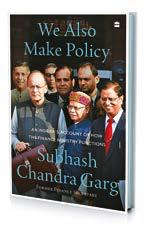Prøve GULL - Gratis
WHAT LED TO URJIT PATEL'S RESIGNATION? AN INSIDER EXPLAINS
Outlook Business
|November 2023
There have been resignations in the Reserve Bank of India (RBI), but governor Urjit Patel's in 2018 over policy differences was a rare event in the history of the central bank, writes former finance secretary Subhash Chandra Garg in his book. He details the frustration of the government with the RBI under Patel and the circumstances that eventually culminated into the latter posting his resignation on the RBI website

The key features of the electoral bond scheme were approved at the highest level of the government in late August/early September, with RBI on board. The bonds were to be issued as physical bonds by scheduled banks authorized by the government.
Governor of RBI, Urjit Patel, for reasons best known to him, wrote to Finance Minister Arun Jaitley sometime in the middle of September questioning the issuances of bonds by anybody/bank other than RBI.
Equating the bonds as currency, he wanted RBI to issue the bonds as it was the monopoly issuer of currency. This was a shocking ask. The RBI Act had been amended, which provided for the government-authorized scheduled banks to issue electoral bonds. By making this proposal, he was questioning the law of the land.
The second suggestion was a bigger shocker. Urjit Patel proposed that the bonds be issued in digital, not physical mode. This implied that potential donors would have to apply digitally to RBI to buy electoral bonds; and RBI after completing the entire process of KYC and collecting funds from the buyer's bank account would issue a digital bond that the buyer would digitally transfer to a political party. Finally, the political party would collect the proceeds of the bond digitally by going through the banks. Every political party would know who had contributed, and so would the EC and RBI. This would kill the most important feature that Arun Jaitley wanted to build in-the anonymity of the donor vis-àvis political parties.
Denne historien er fra November 2023-utgaven av Outlook Business.
Abonner på Magzter GOLD for å få tilgang til tusenvis av kuraterte premiumhistorier og over 9000 magasiner og aviser.
Allerede abonnent? Logg på
FLERE HISTORIER FRA Outlook Business

Outlook Business
From 400 MW To 5 GW: Kalpa Power's Blueprint To Scale
Founder Rounak Muthiyan on leveraging productised BESS and centralised digital governance to deliver both 24/7 power and ten-fold growth.
2 mins
January 2026

Outlook Business
Purpose Driven Innovation Shaping Tech Future
How Isha Das blends technology with social impact
1 min
January 2026

Outlook Business
'QBurst CEO Unpacks The 'High Al-Q' Mandate For Enterprise Growth
From Al-powered tools to Al-first strategy, QBurst's CEO explains the roadmap to intelligent enterprises.
2 mins
January 2026

Outlook Business
A Ride to Remember
A motorcycling road trip could be the ultimate adrenaline rush combining adventure along with relative comfort
7 mins
January 2026

Outlook Business
Falak Kabrawala Champions Integrated Digital Growth Strategies
Aligning marketing, technology, and trust for sustainable business transformation
2 mins
January 2026
Outlook Business
How AeroNero Solutions Is Scaling Science-Backed Atmospheric Water Generation For Lasting Water Security
Dr. Durga Das, Founder and CEO of AeroNero Solutions, is driven by a singular conviction: that the world's most pressing challenges demand solutions that are both scientifically rigorous and human-centric.
4 mins
January 2026

Outlook Business
Building The Invisible Layer Of Collections: Kannan Sriraman's Spocto X Journey
Engineering AI-driven collections systems that scale quietly, stay compliant, and respect human outcomes
1 mins
January 2026

Outlook Business
Distilling the Heartland
Built far from India's metros, a legacy player is strengthening manufacturing while developing premium brands to compete in a rapidly expanding alcobev market
5 mins
January 2026

Outlook Business
Chetu Builds Noida's Legacy Through Code, Talent, and Community
As Chetu, a global leader in AI and digital transformation solutions, celebrates more than a quarter of a century, the software leader's legacy shines brightest in Noida, Uttar Pradesh. This is not just because of its business achievements, such as serving clients across countries and pioneering enterprise AI solutions, but through its unwavering dedication to India's tech ecosystem and social progress. This vision comes alive through the Chetu skill centre and the Chetu Foundation, two cornerstone initiatives that demonstrate sustainable impact.
1 min
January 2026

Outlook Business
Building Institutions That Serve The Nation
How Ramya Ramachandren is shaping education, healthcare, and social impact
2 mins
January 2026
Translate
Change font size

